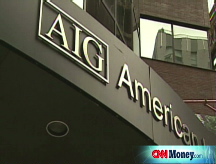GM: Bailout push can't halt stock slide
Investors worry that even if government helps solve cash crisis at No. 1 automaker, shareholders will lose out.

NEW YORK (CNNMoney.com) -- The stock of General Motors plunged Monday to a six-decade low as investors worried that a federal government bailout of the embattled automaker could essentially wipe out the stakes of current shareholders.
GM (GM, Fortune 500) warned on Friday, when announcing a $4.2 billion operating loss, that it was running dangerously low on the capital it needs to fund the business unless it receives government assistance or the battered U.S. auto market turns around.
GM's news and a direct appeal to Congress on Thursday by the heads of GM, Ford Motor (F, Fortune 500), Chrysler LLC and the United Auto Workers union have pushed the cause for federal help forward. President-elect Barack Obama said Friday that he supported the concept of helping for the auto industry.
Over the weekend, House Speaker Nancy Pelosi, D-Calif, and Senate Majority Leader Harry Reid, R-Nev., wrote to Treasury Secretary Henry Paulson asking that he look into using a $700 bailout package originally aimed at the nation's banks and Wall Street firms to help the automakers.
The letter Pelosi and Reid suggested that the government should receive equity in the auto companies in exchange for any federal bailout.
GM stock fell nearly 22.9% on Monday to $3.36 a share, its lowest close since finishing at a split-adjusted $3.35 on June 22, 1949, according to data from the University of Chicago's Center for Research in Security Prices.
Analysts said Monday that current shareholders were now in a lose-lose situation: They may be wiped out as part of a federal bailout, or they may be wiped out if the government stays away and GM ended up in bankruptcy.
"When you come hat in hand to Washington, there's a price that has to be paid," said Art Hogan, chief market analyst at Jefferies & Co. At the least, Hogan said, the taxpayers' equity position would greatly dilute common shareholders' current holdings, valued in the market today at less than $2 billion.
"And that's assuming a bailout works," said Hogan. "Who knows if it's too little too late?"
Two analysts -- Rod Lache of Deutsche Bank and Brian Johnson of Barclay's Capital -- downgraded GM to a sell recommendation on Monday.
Lache shook up the street by setting a $0 target price target, the only such target by any analyst for any S&P 500 company, according to Thomson Reuters. Lache's note echoed the idea that shareholders stood to be wiped out either way, with a bailout being akin to a bankruptcy as far as shareholders are concerned.
Of the 12 analysts tracked by Thomson Reuters who follow GM stock, eight of them with either a sell or strong sell recommendation, three have hold recommendations and only one has a buy recommendation.
Efraim Levy, the equity auto analyst at Standard & Poor's, is one of those with a sell recommendation and a $3 target price. He agrees that even with a bailout, it's going to be a tough time ahead for GM shareholders.
"To me it looks likely there will be a bailout," said Levy. "But the situation keeps looking worse and worse. You keep thinking you've hit the center of the storm, and we'll come out the other end and things will get better, but every month demand shrinks."
GM Chief Executive Rick Wagoner said during the conference call with investors Friday that the company isn't ready to speculate on the chance of bankruptcy, despite their dire cash situation.
Company executives said they were encouraged by the support the industry has been getting on possible federal assistance, but GM President Fritz Henderson said it was "premature at this point" to discuss whether GM would grant shareholders stock or stock warrants in return for assistance. ![]()





